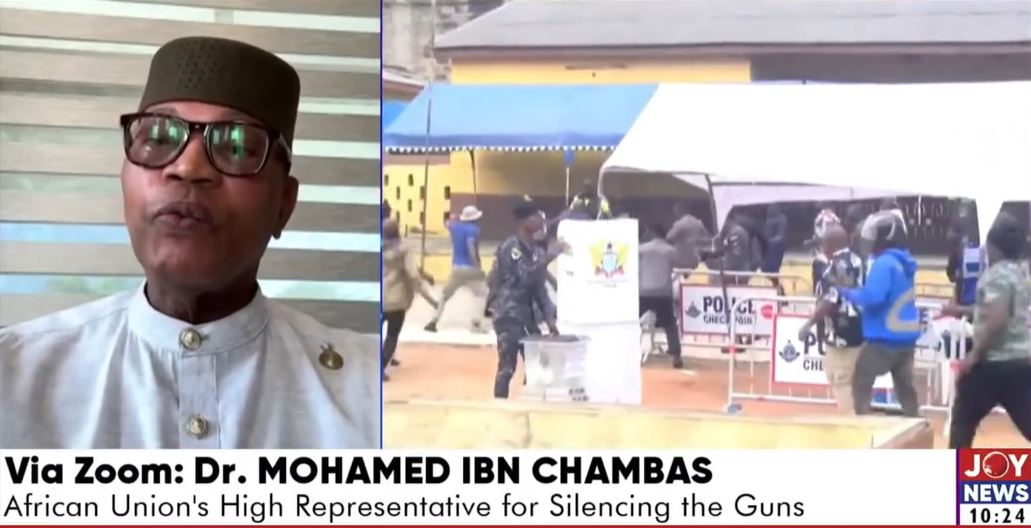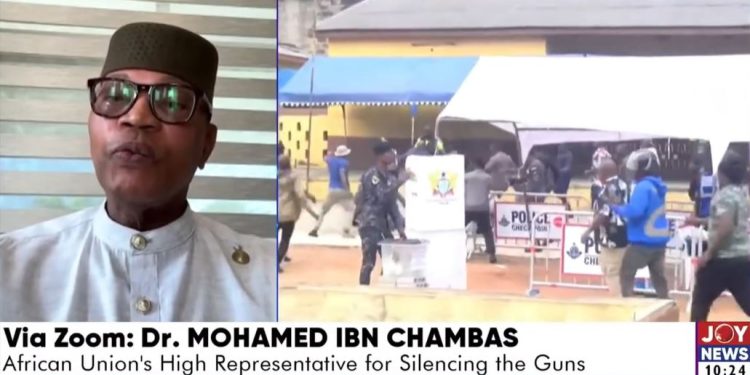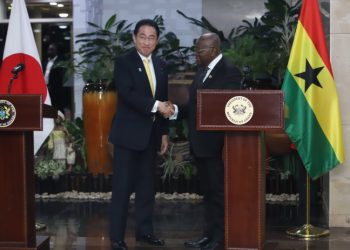
Dr. Mohammed Ibn Chambas, the African Union High Representative for Silencing the Guns, has issued a call to political parties to take urgent action and end the persistent cycle of electoral violence.
His charge comes in the wake of disturbing incidents that marred the Ablekuma North parliamentary rerun election on Friday, July 11, raising fresh concerns about the integrity of Ghana’s electoral process.
Speaking on JoyNews on Monday, Dr. Chambas acknowledged Ghana’s standing as a beacon of democracy in West Africa but cautioned against complacency in the face of recurring violence.
“Let’s face it, these incidents of violence are also limited to a known area. So, they are usually hotspots that we are able to identify way ahead of elections,” he noted, referencing the work of civil society groups.
[embedded content]“So we have very good early warning analysis to tell us where problems could arise, including by security agencies. I’m aware of all of that. So the issue is now to do the work that is required.”
The Ablekuma North rerun, necessitated by irregularities in the December 2024 general elections, was intended to be a peaceful democratic exercise.
However, it was marred by multiple reports of physical assaults, intimidation, and disruptions, particularly at polling centres such as St. Peter’s Methodist Church.
Journalists covering the election, including Kwabena Agyekum Banahene, Salomey Martey, and Vida Wiafe, reported being physically attacked, prompting police investigations and even an interdiction of an officer. Political figures, including former Fisheries Minister Mavis Hawa Koomson, were also allegedly targeted.
Dr. Chambas specifically condemned the scenes of unprovoked aggression.
“But the scenes that we see of, you know, attacking former, you know, leaders and, I mean, senior leaders of political party ministers and all of and and others, it’s just not tolerable. It’s unacceptable, and it’s a long list.”
He emphasised that leaders from both major political parties have fallen victim to such acts over the years.
He stressed the need for dialogue and positive engagement with the youth, often at the forefront of such disturbances.
“It requires, you know, dialogue and training and engaging these youth constructively and positively to eschew violence and to understand what elections are about and what their role is. The youth wing of a party has a role to mobilise people and get people to come out and vote and get a high turnout. There’s no question about that.”
Dr. Chambas’s remarks underscore the persistent challenge posed by political party militias in Ghana.
Despite the passage of the Vigilantism and Related Offences Act 2019 (Act 999), which outlaws these groups and their activities, they continue to operate, often with impunity.
These groups, often loosely organised and comprising unemployed or underemployed youth, are allegedly used by political parties to exert influence, intimidate opponents, and disrupt electoral processes.
Ghana, often lauded for its democratic stability in a volatile West African region, has nonetheless witnessed a disturbing pattern of election-related violence.
The December 2024 presidential and parliamentary elections recorded at least six deaths linked to electoral violence, following eight fatalities in the 2020 elections. These incidents include physical confrontations, ballot box snatching attempts, and sometimes, the use of firearms, creating an atmosphere of fear that deters voters and observers alike.
The African Union envoy highlighted the critical difference between Ghana’s situation and that of some of its neighbours.
“Because of the death numbers, the death toll is usually not as high as in other cases outside Ghana. This doesn’t get the international publication, but we know what is going on here.”
He cited fears in nearby Côte d’Ivoire about large numbers of people potentially leaving the country before their October 2025 elections due to concerns over violence.
“And they are saying, how come we can’t be as peaceful with our elections as Ghana and then we see these pictures which which are quite disturbing,” he remarked.
Dr. Chambas concluded with a stern warning against allowing such isolated incidents to escalate: “Sometimes they say it just needs a little flick of fire to start a bushfire. So we should be careful to avoid allowing it to perpetuate itself and to degenerate.”
His call reinforces the urgent need for robust enforcement of existing laws, genuine political commitment from all parties to denounce and dismantle vigilante groups, and sustained efforts at civic education and youth engagement to safeguard Ghana’s hard-won democratic reputation.
The onus, he implied, is on Ghana’s political leadership to ensure that electoral contests are decided at the ballot box, not through violence.
DISCLAIMER: The Views, Comments, Opinions, Contributions and Statements made by Readers and Contributors on this platform do not necessarily represent the views or policy of Multimedia Group Limited.
DISCLAIMER: The Views, Comments, Opinions, Contributions and Statements made by Readers and Contributors on this platform do not necessarily represent the views or policy of Multimedia Group Limited.
- President Commissions 36.5 Million Dollars Hospital In The Tain District
- You Will Not Go Free For Killing An Hard Working MP – Akufo-Addo To MP’s Killer
- I Will Lead You To Victory – Ato Forson Assures NDC Supporters
Visit Our Social Media for More



